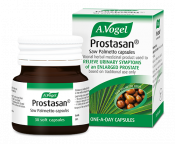The prostate gland
The prostate is a small gland found in men. It sits just under the bladder and with age, the prostate has a tendency to enlarge.  This condition is commonly referred to simply as ‘an enlarged prostate’. The medical term for an enlarged prostate is benign prostatic hyperplasia (BPH). The use of the word benign is significant – it indicates that the condition is not life-threatening, in contrast to prostate cancer, the prostate problem we hear about more frequently. The enlarged prostate is an increasingly common problem as a man becomes older. It is estimated that:
This condition is commonly referred to simply as ‘an enlarged prostate’. The medical term for an enlarged prostate is benign prostatic hyperplasia (BPH). The use of the word benign is significant – it indicates that the condition is not life-threatening, in contrast to prostate cancer, the prostate problem we hear about more frequently. The enlarged prostate is an increasingly common problem as a man becomes older. It is estimated that:
- Around 3.2 million men in the UK have symptoms arising from an enlarged prostate
- 50% of men over the age of 50 show signs of prostate enlargement
- By the age of 70, about 80% of men have an enlarged prostate.
Symptoms of an enlarged prostate
Although an enlarged prostate is not in itself a life-threatening condition, it can give rise to a number of inconvenient symptoms which if severe enough, can affect your health and quality of life. As the prostate enlarges, it presses against the bladder and interferes with the way it works. This gives rise to a number of symptoms relating to bladder function and urination. The most common of these are:
- Having to get up at night for a pee
- The need to pass water frequently
- Poor urine flow – also known as poor stream
- Dribbling at the end of urination.
More information on what you can expect if you suffer from prostate enlargement may be found on our page on enlarged prostate symptoms.
Do I have an enlarged prostate?
If you are experiencing some of the symptoms mentioned above, you may wish to look at our Enlarged Prostate Symptom Checker page. Based on the International Prostate Symptom Score (IPSS), this is a test with 7 questions and will give you a broad indication of whether you are suffering from the problem and if so, how severe it is likely to be. If you already know you have an enlarged prostate, the Symptom Checker page can also be used to monitor the progress you make whilst on any treatment.
look at our Enlarged Prostate Symptom Checker page. Based on the International Prostate Symptom Score (IPSS), this is a test with 7 questions and will give you a broad indication of whether you are suffering from the problem and if so, how severe it is likely to be. If you already know you have an enlarged prostate, the Symptom Checker page can also be used to monitor the progress you make whilst on any treatment.
However, it is advisable to have your symptoms checked by a doctor, to rule out any underlying prostate conditions, including prostate cancer.
I think I have an enlarged prostate – what next?
If you are experiencing the symptoms described on this page, have used our Symptom Checker page and think you have an enlarged prostate gland, the next thing you should do is to have the diagnosis confirmed by your doctor. This visit should be fairly straightforward as in most cases, a diagnosis can be made on the medical history and symptoms.
However, in order to exclude other causes of your symptoms, (including prostate cancer) the visit may involve an internal examination to assess the size of your prostate gland and blood tests.
Treatment options
Having formed a diagnosis, your doctor will be in a position to discuss treatment options with you. In general, the treatment of an enlarged prostate will depend on the severity of your symptoms.
- If you suffer mild symptoms, your doctor may suggest that you simply sit and wait. This is known as ‘watchful waiting’ - seeing how the condition develops.
- If you have moderate symptoms, your doctor may recommend that you use one of a number of prescribed drugs known as α-blockers and 5α-reductase inhibitors.
- If your symptoms are severe, your doctor may refer you for a hospital appointment with a urologist, with the view of considering whether surgery may be of benefit.
- Herbal remedies. An increasing number of doctors may also discuss with you the use of the herb Saw Palmetto in treating mild to moderate symptoms of an enlarged prostate. The herb can be used as an alternative to ‘watchful waiting’ or if there is a need to avoid the use of prescribed medicines.
For more information, follow the link to treatment of an enlarged prostate.
Helping yourself
There are a number of things you can do to help yourself if you suffer from an enlarged prostate. The typical high-fat Western diet and a lack of vegetables and pulses appear to be factors contributing to prostate enlargement. Foods such as broccoli, brussel sprouts, cabbage and kale appear to be beneficial as are foods rich in zinc such as pumpkin seeds, pine nuts and shellfish.
Follow the link to our page on Eating for a healthy prostate for more information.








